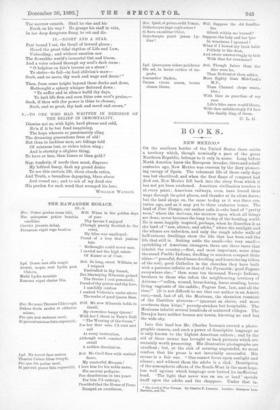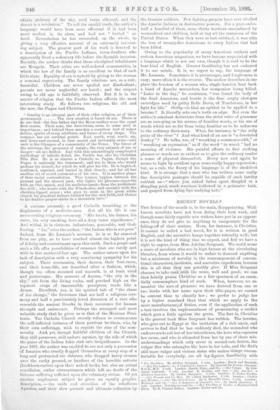B 0 0 K S.
NEW MEXICO.*
ON the southern border of the United States there exists a territory which, though nominally a part of the great Northern Republic, belongs to it only in name. Long before North America knew the European invader, three-and-a-half ' centuries ago, New Mexico was overrun by the fiery pioneer. ing energy of Spain. The vehement life of those early days was but shortlived, and when the first flame of conquest had died out, New Mexico fell back into the sleep from which it has not yet been awakened. American civilisation touches it at every point; American railways, even, have forced their ways through its quiet places, and thunder at its silent doors ; but the land sleeps on, the same to-day as it was three °en, tunes ago, and as it may yet be three centuries hence. The land of Poe° Tiempo, our author calls it—the land of " pretty soon," where the martana, the morrow upon which all things are done, never becomes the busy to-day of the bustling world. Ho is more happily inspired, perhaps, when he describes it as the land of " sun, silence, and adobe," where the sunlight and the silence are unbroken, and only the rough adobe walls of half-ruinous dwellings show the life that has been and the life that still is. Setting aside the small—the very small—. sprinkling of American strangers, there are three races that inhabit the country ;—first, and most important, some nine thousand Pueblo Indians, dwelling in nineteen compact little cities—" peaceful, fixed house-dwelling and house-loving tillers of the soil; good Catholics in the churches they have built with a patience infinite as that of the Pyramids ; good Pagans everywhere else ; then some ten thousand Navajo Indians, brothers to those who infest the neighbouring territory of Arizona—" sullen, nomad, horse-loving, horse-stealing, horse. living vagrants of the saddle ; Pagans first, last, and all the time." (It is not difficult to see that our author is an Ameri. can),—and, last of all, the Mexicans, the shrunken remnant- of the Castilian pioneers—" ignorant as slaves, and more courteous than kings," poverty-stricken but hospitable. The Mexicans inhabit several hundreds of scattered villages. The- Navajos have neither houses nor towns, knowing no roof but the wide sky.
Into this land has Mr. Charles Lummis carried a photo. graphic cameras, and such a power of descriptive language as is only known to the highest American culture ; and by the aid of these means has brought us back pictures which are certainly worth preserving. His illustrative photographs are excellent ; but, at the risk of seeming ungrateful, we must confess that his prose is not invariably successful. His excuse is a fair one. " One cannot focus upon sunlight and silence ; and without them the adobe is a clod. Description of the atmospheric effects of the South-West is the most hope- less wall against which language ever butted its ineffectual head. ' The light that never was on sea or land' spends itself upon the adobe and the chapparo. Under that in- • The Land of Poo Tiempo. By ()harks P. Lummis. London Sampson Lows Marston, and 00. effable alchemy of the sky, mud turns ethereal, and the desert is a revelation." To tell the candid truth, the author's language would have been more effectual if it bad been more modest in its aims, and had not " butted " so hard. Nevertheless he has succeeded, on the whole, in giving a very effective account of an extremely interest- ing subject. The greater part of his work is devoted to a description of the Pueblo Indians, town-dwellers who apparently lived a sedentary life before the Spanish invasion. Racially, the author thinks that these aboriginal inhabitants are Mongols. Their cities are well-ordered communities, in which the law of the family is as excellent as that of each
little state. Equality of sex is upheld by giving to the woman a nominal superiority. The family relations are, as a rule, beautiful. Children are never spoiled nor disobedient ; parents are never neglectful nor harsh ; and the respect owing to old age is faithfully observed. But it is in the matter of religion that the Pueblo Indian affords the most interesting study. He follows two religions, the old and the new, the Pagan and Christian.
" Duality is an integral part of their elder religion, as of their
government The very creation is based on sex. There is no one God—the Sun.father and the Moon-mother were the equal first causes. Their sons, the hero-twins, seem to come next in importance ; and behind them marches a countless host of minor deities, spirits of every attribute, and forms of every shape. The compass has six cardinal points. East, north, west, south, up, and down-and-around, in that sacred and inviolable order—and each is the Olympus of a community of the Trues. The forces of the universe, the processes of nature, the very animals of use or danger—all are deified. And with this astoundingly complicated mythology of infinite detail, the Pueblo has also his Christian Tata Dios. He is as sincere a Catholic as Pagan, though the Pagan is naturally the innermost ; and woe to them who would profane his church, for which he will give his life. Ile is baptised, -confirmed, married, and buried in that church ; and for all has another set of secret ceremonies of his own. It is another phase of their racial contradiction. This human hyphen between the present and the utmost past, who lights his pleasure-cigarette with an Ohio match, and his medicine-smoke from the prehistoric fire-drill ; who hunts with the Winchester, and executes with the obsidian-tipped arrow ; who goes to mass in the great adobe church his practical fathers blinded for the new faith, and thence to his feather prayer-sticks in a mountain cave."
A curious anomaly, a good Catholic trembling at the displeasure of a medicine-man. But all his life is one never-ending religious ceremony. " His hunts, his dances, his races, his very smoking, have all a deep inner significance." And withal, he is virtuous, industrious, peaceable, and God- fearing. " Lo," cries the author, " the Indian who is not poor." Indeed, from Mr. Lummis's account, he is so far removed from our pity, as to have reached almost the highest point of felicity and contentment upon this earth. Such a people and such a life offer possibilities of romance that are rarely met with in this matter-of-fact age. The author enters upon his task of description with a very convincing sympathy for his subject. Their ceremonies, their dances, their foot-races, and their home-life, are described after a fashion, which, though too often strained and uncouth, is at least vivid and picturesque. His account of Acoma, "the city in the sky," cut from the living rocks, and perched high on the topmost crags of inaccessible precipices, reads like a dream. Excellent, too, is his spirited tale of " the chase of the chongo," the foot-races that are half a religious cere- mony and half a passionately loved diversion of a race who resemble the ancient Greeks in their reverence for human strength and endurance. Perhaps the strangest and most valuable study that he gives as is that of the Mexican Peni- tents. The Catholic Church sternly refuses to countenance the self-inflicted tortures of these penitent brothers, who, by their own sufferings, wish to expiate the sins of the com- munity. And. yet, though faithful children of the Church, they still persevere, still endure agonies, by the side of which the pains of the Indian fakir sink into insignificance. In the year 1891, the author was enabled to see not only u procession of fanatics who cruelly flogged themselves at every step of a long and protracted via dolorosa, who dragged heavy crosses over the rocky ground, or burdens of the horrible entraiia (buckhorn-cactus) upon their naked backs, but also an actual crucifixion, under circumstances which left no doubt of the hideous suffering inflicted upon the voluntary victim. Of yet another unpleasant subject he gives an equally graphic description, — the raids and atrocities of the rebellious Apaches, and their slow pursuit and ultimate reduction by
the frontier soldiers. Few fighting peoples have ever rivalled the Apache Indians in destructive powers. For a year-and-a- half a handful of them, some thirty warriors encumbered by womankiud and children, held at bay all the resources of the United States. When they were at last subdued, it was with the loss of twenty-five Americans to every Indian that had been killed.
Owing to the popularity of many American authors and certain American magazines, we have become acquainted with a language which is not our own, though it is said to be the best kind of English. Greater familiarity has not endeared it to our minds. It is, we regret to say, the language of Mr. Lummis. Sometimes it is picturesque, and forgiveness is easy; more often it is the reverse. The author describes in one place the heroism of a woman who, single-handed, beat back a hand of Apache marauders, her companion being killed. "Later in the day," he continues, "was found the body of the dead American, and beside it the four empty shot-gun cartridges used by gritty Belle Davis, of Tombstone, in her fight for lif e." Gritty—is that an epithet to be applied to a heroine P It literally sets one's teeth on edge. Not even the author's constant deviations from the strict rules of grammar are so annoying as his misuse of familiar words, or his use of words which are so far from being familiar as to be unknown to the ordinary dictionary. What, for instance, is "the roily pulse of the river "P. And what kind of an ass is "a devoluted donkey " ? He talks, too, of "wreaking a commonwealth," or " wreaking an expression," as if the word " to wreak " had no meaning of violence. His painful efforts to find striking phrases or words are so evident as to give the ordinary reader a sense of physical discomfort. Every now and again he seems to light by accident upon some really happy expression; but, as a rule, the finery of his language' is of the shoddiest kind. It is strange that a man who has written some really fine descriptive passages should be capable of such tawdry rubbish as—" where yon naked babes sport dimpled in a dimpling pool, stark warriors, wallowed in a grimmier bath, and gasped from dying lips undying hate."



































 Previous page
Previous page